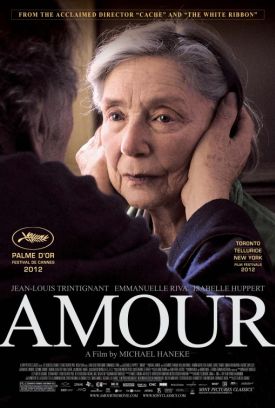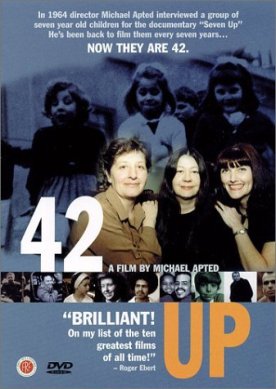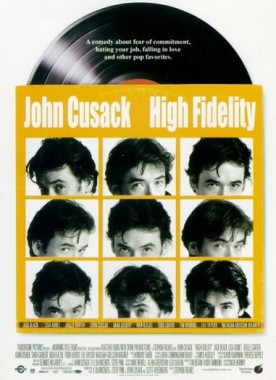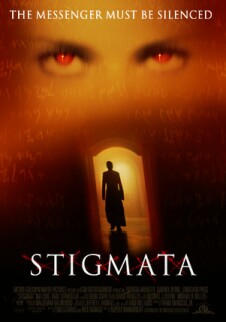Amour
The fourth major character in Michael Haneke’s Amour, after the elderly couple played by Jean-Louis Trintignant and Emmanuelle Riva and their daughter, Eva (Isabelle Huppert), is the Parisian flat where the couple, Georges and Anne, have apparently lived for decades. Apart from one early scene in a concert hall — disconcertingly filmed from the stage so that the audience mirrors the cinema audience — where one of Anne’s star piano students is giving a recital, the film never leaves their apartment, even though they do. The sense of inhabiting a confined space from which there is no exit becomes a living metaphor for Georges’s and Anne’s confinement in their failing bodies and their unfailing marriage. The apartment, like the marriage, is a lovely prison in which these people have willingly incarcerated themselves and grown comfortable from long familiarity. When Anne returns from a failed operation to correct a blockage in her carotid artery that is causing a series of strokes, she begs: “Promise me that I’ll never have to go back to the hospital.”
She is asking to die at home, among her familiar things and comforted by the familiar relationship with her husband, though it turns out there is no comfort for either of them. “We’ve always coped, your mother and I,” says Georges to Eva, rebuffing her unhelpful offer of help. Like everything else in the movie, there is a strong sense of inevitability about their estrangement from her, and not only because we already know how it will end. Up front, Mr Haneke puts a flash-forward to firemen breaking in to the sealed apartment to find a flower-strewn body on the bed. But the whole presentation of the life of the couple as it unfolds from the earliest frames sets up the only possible ending. Also at the beginning, when the couple return home from the concert, they find signs of an attempted forced entry. Nothing is missing, but we can’t help feeling that death has broken in at last upon their life-long idyll. The hint of foreboding, as in a horror-film is not easy to shake off.
It is as if Mr Haneke were insisting — as he does in his once-seen, never-to-be-forgotten Funny Games — that we cannot be allowed to approach his characters if we retain any hope for them on this earth. There is also a hint of the horror-film scenario a bit later when Georges has a nightmare, dramatized for us as his discovery of ankle-deep water in the corridor and a hand reaching out of the darkness to seize him by the neck. Illustrative visual metaphors multiply. At another point, a pigeon flies in the window and Mr Trintignant is forced to scurry around in an effort to find the means of ejecting it. In the context the image may call to mind that of the Venerable Bede when he compared the life of a man to a sparrow’s transit, out of a cold winter’s night, through one window of a warm and lighted mead hall filled with feasting and out at another window again, back into the night.
Most importantly, of course, the lifelong intimacy between Georges and Anne is here translated into the images of infirmity and death. When Georges attempts to wrestle the nearly helpless Anne from wheelchair to bed or bed to wheelchair, the two briefly seem to be dancing, as one imagines they did in their youth, but with a melancholy difference as to the consummation to be expected. Again as in Funny Games, the viewer may feel himself bludgeoned by images portending death and great sorrow. For here there can be no transcendent meaning in what we know is to come, no comforting sense of fulfilment or peace or transfiguration through suffering. Suffering is just suffering and death is just death: mean and ugly and hateful and utterly without any redeeming qualities. Indeed, the end of life is so horrible that it casts a pall backward over what we suppose had been long happiness and ultimately makes Georges and Anne, in different ways, hate their own lives for requiring such an end.
The place of music in the film, I take it, is to stand for the joy in life that has now fled. When the young pianist and former pupil, Alexandre, played by real-life pianist Alexandre Tharaud, comes to visit, he tells Georges and Anne that “My life revolves around Schubert now” — and, in a way, everyone’s life revolves around Schubert, dead himself at 31 and associated with death through “Death and the Maiden” and other works. A memory — or a fantasy — of Anne playing one of the most heart-breakingly beautiful of the composer’s Impromptus, the third of D. 899 in G flat major, underlines the point. You can hear Mr Tharaud play it here. In the film, however, it is cut off in the middle. We are yanked back into what it insists is reality when Georges turns off the recording. Life ends, and so does the music that had been the point and purpose of these particular lives.
Except that it doesn’t, of course. Schubert’s music is precisely that of him which lives on, and will live on as long as there is anyone left to hear it. Similarly, Eva and Alexandre, in different ways, are what will survive of Georges and Anne, but stern Mr Haneke will allow neither them nor us any comfort from this. Small wonder that the world looks so bleak when all you choose to see of it is the bleak parts: the pain, the suffering, the loss and the moral nullity at the end of all when there is nothing else in life. There is certainly a sad truth to these things, but it is not the whole truth unless you insist on its being so, as Amour does. Our serious culture is now dominated by this teaching: that heartbreak and sorrow and loss, like violence and sex, are the touchstones of “reality.” And the corollary is that there must be something fake about hope or happiness or consolation. It’s a pity that such a talented film-maker as Michael Haneke should be so uncompromising in his adherence to this kind of principled despair.
Discover more from James Bowman
Subscribe to get the latest posts to your email.







